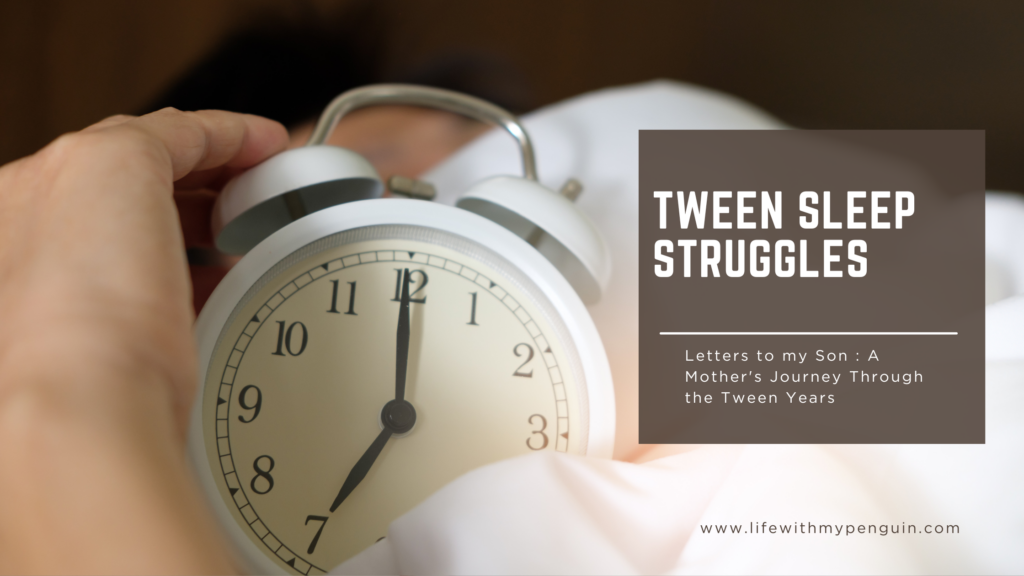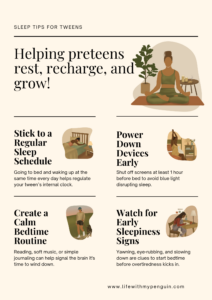Dear friend,
I am a fellow parent raising a tween boy. And I have to discuss something with you today and not with Penguin.
Let’s talk about sleep. The silent battle we often don’t realize we’re fighting, until the toll becomes too visible to ignore.
If you’re anything like me, you’ve probably had nights of arguments, gentle pleadings, negotiations, and outright bribery just to get your tween/ pre-teen into bed. I used to think, maybe if I just relaxed a bit, let my son manage his own sleep schedule, his body would tell him when enough was enough. After all, isn’t it about independence at this stage?
But here’s the truth no one tells you loudly enough. It’s a myth that tweens will naturally self-regulate their sleep if left to their own devices.
The reality is harsher.
Chronic sleep deprivation is becoming an invisible epidemic among tweens today, hidden behind busy schedules, endless scrolling, late-night gaming, after-school activities, and the mounting pressures they feel, even if they don’t say it aloud.
And here’s the kicker, sleep deprivation doesn’t just make them yawn in class. It shows up as attention issues, irritability, emotional outbursts, poor learning, and even hyperactivity.
Yes, the kid bouncing off the walls may not just be restless; they might be sleep-deprived.
Many of us have tried to compensate, letting them sleep in on weekends, canceling morning outings so they can “catch up.”
But science is clear. Lost sleep cannot be made up. Once it’s gone, it’s gone.

So, what can we do as parents?
Firstly, we must ditch the guilt about setting firm, non-negotiable bedtimes. Children actually feel safer with structure, even if they push against it in the moment.
By laying down ironclad bedtime rules, we eliminate nightly debates that actually rev them up more — arguments activate their bodies and minds when they should be winding down.
But here’s something I learned the hard way. Enforcing bedtime isn’t enough.
We also need to teach sleep skills, because even compliant kids can lie in the dark battling a brain full of worries, to-do lists, or fears. It’s our job to create the conditions for restful sleep — and that means calming nighttime routines, tech cut-offs, a cool, dark room, and most importantly, patience.
How much sleep do tweens really need?
According to science,
| Age | Hours |
| 8 | 10¼ to 10¾ |
| 9 | 10 |
| 10 | 9¾ to 10 hours |
But life isn’t formulaic. Sleep needs also increase during growth spurts, stress periods, or when physical activity is high.
Signs your child may be overtired:
- Puffy eyes, sunken look
- Slow speech and movements
- Morning grumpiness or dragging
- Trouble concentrating at school
- Falling asleep during car rides
- Afternoon meltdowns or crankiness
- Hyperactivity at bedtime
- General tearfulness or emotional swings
Being tired often looks like being wired in tweens. Their system is too revved up to feel sleepy even when they’re exhausted.
That’s why it’s crucial to catch those subtle early signs like yawning, eye rubbing, slowing down and get them ready for bed before overtiredness hits.
What I learned from my own parenting failures
There were times when we pushed bedtime later and later because life was too packed. Homework, classes, my own meetings.
There were phases where bedtime routines were nonexistent because I was exhausted too.
There were times I mistook hyperactivity for “he’s fine” instead of seeing it for what it was sleep debt showing up sideways.
And yes, those nights of pushing back bedtimes often ended in screaming matches, power struggles that left us both drained and guilty.
I realize now being the “bad guy” by enforcing bedtime is far better than being the “cool parent” who watches them spiral silently into sleep debt.
Some things that have helped us lately:
- No screens at least one hour before bed.
- Quiet, non-stimulating activities after dinner — reading, listening to soft music, sketching.
- Keeping bedtime consistent even on weekends (hard but magical).
- Helping my child reflect on how good a well-rested day feels vs. a cranky, exhausted one.
So if you’re in the trenches of bedtime battles, know this…
You’re not alone.
You’re not being mean.
You’re being protective.
You’re giving your child a critical tool for health, learning, and emotional resilience.
If there’s one mantra I’d offer every parent of a tween, it’s this:
“A well-rested child is a resilient child.”
Let’s stand firm — lovingly, calmly, consistently.
Our tweens may fight it now, but one day they’ll thank us for teaching them how to prioritize something that powers everything else in life. Rest.

With you in sleepless solidarity (and hopefully better nights ahead),
A Fellow Parent
I’m participating in #BlogchatterA2Z

Bringing up adolescents is a hard job, right? But enjoyable, I’m sure, especially if you’re a parent. Sometimes I think that God created adolescents to teach parents their lessons.
At times, I feel raising these adolescent is like karma returns. You will suddenly realize all hard times you have given to your parents.